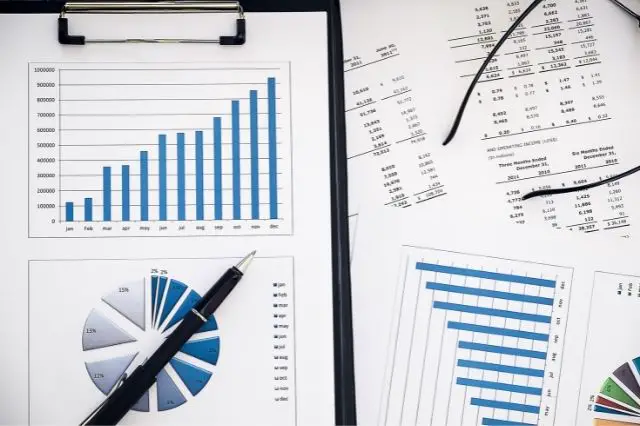Finance
How Can Traders Use Technology to Improve Their Financial Performance?


Screen-based forex trading was the first technology to influence currency trading. As a result of the rise in mobile phone usage and developments in smart technology, Forex trading has become more accessible and easy. Enthusiasts may now trade currencies around the clock from the comfort of their own homes. Because of this, even non-technical buyers and sellers now can make very precise purchases and sales. Forex trading has used a variety of techniques to adapt and respond to the ever-changing technology environment.
Traders these days are “spoiled” by having access to real-time information that used to take hours or even days. With the advent of the internet, it’s never been simpler to keep abreast of current events, both on a local and global scale. Several variables, including inflation, debt, and political stability, have an impact on foreign exchange rates. The ability to assess risk, make well-informed choices and accurately anticipate the market, hinges on having this information at hand.
However, technology’s role in forex trading goes much beyond just disseminating more accurate data. Giant firms no longer have a stranglehold on markets since everyone who has an internet connection may trade from their own homes. In this article, we’ll provide you with information on how Forex trading was transformed by technology and how traders can get the most out of trading with the use of newly developed technologies.
Blockchain Technology
The expanding use of blockchain technology will help to enhance the inclusivity of foreign exchange trading. Blockchain is one of the most secure and convenient methods of storing data related to any business. Smaller traders may now enter the forex market because of the decentralization this creates. It should also be mentioned that as blockchain technology and cryptocurrencies generally became more popular, a big number of investors, started to learn more about cryptocurrency investing and the way it works. There are many similarities between forex trading and cryptocurrency trading, as well. A greater dependence on FX buying and selling will increase as new possibilities become available.
There was an estimated $210 million in global blockchain technology sales in 2016. The same market is expected to rise to US$2.3 billion by 2022, according to analysts. By 2022, the sector is expected to reach a value of US$7.68 billion.
Changes in forex trading, including new alpha potential for FX trading desks, are inevitable as the sell-side now invests in technology like blockchain. The FX business has a unique opportunity to decentralize its record-keeping and boost the availability of the information being maintained since the blockchain provides a reliable, permanent mechanism to preserve information.
AI Technology and Forex Trading
AI, too, has made its way into the broader conversation about currency. Predictive analytics would be greatly enhanced if artificial intelligence (AI) is introduced to the currency market, according to experts. To put it simply, this will enable traders to use AI software to forecast future outcomes. Traders may use predictive analytics to develop more effective trading methods based on historical market data. As a result, traders may concentrate on arranging their deals rather than monitoring and evaluating the data themselves, thanks to AI.
When you think about it, it’s no surprise that new and evolving technology has altered the forex market. Millennials account for more than 43% of all traders, according to recent research. In other words, a large portion of the forex trading community has already mastered this new technology.
Because 90% of forex traders employ robots (Expert advisors) nowadays, artificial intelligence AI in forex trading has a huge influence. It is now possible to evaluate enormous volumes of data, historical pricing, and previous economic occurrences to construct numerous prediction models.
Different percentage application cases underpin machine learning in the financial sector. There is a lot less machine learning in the industry than the general public thinks. Until recently, the phrase “machine learning” was not widely used in the workplace. Because of this, it’s reasonable to expect data analysis and forecasting would be difficult. Contrary to popular belief, finding a formulaic answer to financial issues is not necessary.
Rise of Mobile Trading
With the rise of mobile internet networks, more and more forex traders are depending on mobile applications to conduct their business, which has transformed the scene.
Today, 4G (fourth generation) connection is used by the vast majority of the mobile trade community worldwide. Improved upload and download speeds as well as decreased latency made 4G an enormous leap forward in broadband cellphone networks.
Mobile service providers, on the other hand, have begun to adopt 5G technology late this year. A series of new features are expected to make it at least three times faster than the current version. For mobile internet consumers throughout the globe, 5G looks to be the natural next step in terms of network coverage, speed, and reliability. One may argue, of course, that executing real-time transactions does not need a large amount of bandwidth. Despite this, traders hoping for speedier and more frequent transactions would appreciate any reduction in latency.
The Influence of Technology on Forex Trading
The forex market has seen significant changes in the current period. Internet and electronic devices have had a significant influence on the forex market, with modern technology like “point ‘n click” algorithmic forex trading systems providing an easy-to-use interface to execute transactions without the need for human participation. Consequently, one can plainly observe how the present era’s technology influences forex traders’ judgments and strategies.
On September 29th, 2012, the Dow Jones Industrial Average dropped 400 points in a matter of minutes. While some investors panicked and liquidated their holdings, others using algorithms did so at predefined levels automatically.
For a forex trading strategy, try employing forex arbitrage software to assist you find the finest trading chances. When making investment choices involving foreign currency, forecasters may utilize data from the daily forecaster reports on the world’s most important currencies and commodities, as well as weekly projections of global macroeconomic indicators such as GDP growth rates and inflation figures.
The greatest way for a forex trader to avoid becoming a victim of market manipulation, fraud, and misinformation is to stay well-informed. Traders now have access to more information and transparency than ever before because of the power of technology.
Because of the high entry barriers in forex, it is becoming more difficult for certain individuals to break in. However, new technological advancements are allowing previously closed doors to be opened. Forex has entered the twenty-first century, and it has become a must to do so. These days, it is possible to get real-time rates from all major foreign exchange brokers across the globe from the comfort of your home or office, without the need to go to your broker’s office or download large data files. Because these providers utilize a proprietary software program that allows transactions to be completed after they have been made by the forex trader, this is feasible.
The forex market is very competitive, and technological advancements have helped traders of all skill levels to compete on an equal footing. Forex brokers with smaller spreads and more favorable trading conditions may now be found more easily than ever before, thanks to the proliferation of freely accessible information.
There are a lot of forex app users that are pleased with the way the applications perform. They claim that it’s simple to download and set up, and that many of the features available make it easier for them to trade forex.
There have been a few complaints regarding the lack of customer support or software upgrades from app developers, but these concerns seem to be infrequent generally.
For the most part, forex trading applications are simple to use and include a wide range of useful functions. In certain circumstances, app developers fail to provide enough customer assistance or software upgrades; nevertheless, these complaints seem to be few and far between.


Finance
How Cash Buying is Reshaping the Property Selling Process


In recent years, the dynamics of the property market in the UK have undergone a significant transformation, with the rise of cash buying playing a pivotal role in reshaping the traditional property selling process.
This shift has introduced new opportunities and challenges for sellers, buyers, and industry professionals alike, streamlining transactions and altering expectations on both sides of the market.
The Rise of Cash Buying
Cash buying, where a property is purchased without the need for a mortgage, has become increasingly popular. This method offers a stark contrast to the traditional, often lengthy process of property acquisition, which typically involves securing a mortgage, undergoing extensive credit checks, and navigating a maze of legal requirements.
Accelerated Transaction Times
One of the most appealing aspects of cash buying is the significant reduction in transaction times. Without the need to wait for mortgage approvals or navigate the bureaucratic hurdles associated with loan acquisition, cash transactions can often be completed in a fraction of the time required for traditional sales.
This speed and efficiency are not only beneficial for buyers, eager to move into their new homes, but also for sellers who are looking to complete the sale swiftly and with minimal fuss.
The Impact on Market Dynamics
Cash buying has also had a profound impact on market dynamics, particularly in highly competitive areas. Sold online estate agents London captures the essence of the digital transformation in the property market, where platforms now facilitate rapid, direct transactions, often involving cash buyers.
This shift has led to increased liquidity in the market, enabling quicker sales and often resulting in closer to asking price offers, as the traditional barriers to sale are removed.
The Changing Role of Estate Agents
The rise of cash buying has necessitated a change in the role of estate agents. No longer just mediators between buyers and sellers, agents now must navigate a landscape where speed, efficiency, and an understanding of cash transactions are paramount.
Estate agents are increasingly leveraging online platforms to match cash buyers with sellers, streamlining the process, and offering a more dynamic service tailored to the modern market’s needs.
Digital Platforms and Market Access
Digital platforms have become crucial in connecting cash buyers with sellers, offering a broader reach and access to a wider array of properties. This digital shift has democratized access to the property market, allowing for a more inclusive range of participants, from seasoned investors to first-time buyers looking to avoid the traditional mortgage route.
Benefits and Considerations for Sellers
For sellers, the appeal of cash buying is clear: quicker transactions, reduced risk of sales falling through, and the elimination of chain dependencies. However, it’s essential for sellers to conduct due diligence on their prospective buyers, ensuring that funds are verified and the transaction is secure.
Navigating the Future Landscape
As the property market continues to evolve, both sellers and buyers must adapt to the new norms introduced by cash buying. For sellers, understanding the benefits and potential pitfalls of cash offers is crucial. For buyers, the ability to move quickly and secure properties without the need for mortgage approval can be a game-changer, particularly in competitive markets.
A New Era for Property Transactions
The shift towards cash buying is indicative of a broader trend towards efficiency and speed in the property market. As technology continues to advance, we can expect further innovations that will streamline the buying and selling process, making it more accessible, efficient, and transparent for all parties involved.
Beyond the Conclusion: A Glimpse into the Future
As we look towards the future, the landscape of the property selling process will continue to be shaped by the trends of cash buying and digital transformation. This evolution promises a more streamlined, efficient, and flexible market, where opportunities abound for those willing to adapt and embrace the new paradigms of property transactions.
Finance
Everything You Need to Know about SVG Permit When Making a Decision


Many companies strive to simplify the process of receiving a work permit, so they prefer offshore jurisdictions.
SVG offers favorable legislation, low financial costs for getting an SVG Forex license, and a favorable tax policy. If you plan to engage in brokerage activities in the market, you will need to obtain a permit and meet the Regulator’s demands.
How does permitting control work?
The FSA exercises control over non-banking companies and helps ensure stability through a competent assessment of possible risks associated with firms’ activities. Through monitoring and on-site audits, the FSA regularly analyzes various financial indicators and checks organizations’ reporting for compliance with established demands.
The state has many legislative documents that form the legal basis for providing financial services. Let’s list some of them:
- Financial Services Management Law – regulation of financial activities and issuance of licenses;
- Securities Law – controls the activities of firms whose activities are related to the trading, issuance, and exchange of securities (including the Forex market);
- Memorandum of Requirements for BC and LLC – defines the demands for organizations in the Forex market;
- Law on International Business Companies – controls the activities of firms, including in the market;
- Currency Control Act – regulation of foreign exchange financial transactions and supervision of compliance with established demands.
It is only part of the legislative framework. There are also laws to combat AML/FT, ensuring cybersecurity and protecting consumers from financial risks.
Demands
To obtain a permit, you must fulfill several demands. Your firm must have at least 1 director, 1 shareholder, and a secretary. One of the directors must be a resident of this area. You must register a firm office and give the company a unique name using the LLC form. You must also present valid licenses from the states where the organization provides financial services. It is critical to comply with local legislation and include an AML and KYC (know your customer) policy in the company’s activities.
Stages of starting a firm
Let’s consider what stages an organization will need to go through to register the legal activities of a broker in this area.
Decide on the firm name
The company name must be unique and not appear in the SVG company register. In addition, the company abbreviation must imply the LLC form, and Limited or Ltd must be added at the end of the name. Using a name that would indicate royal or government institutions is strictly forbidden.
Collect a package of papers
In the first stage, your firm will be required to provide papers, which will include the following:
- fill out an application for a permit;
- notarized identity cards, confirmation of registration, and certificate of good conduct for the company’s staff;
- corporate documents;
- office lease agreement with a registered legal address;
- a detailed business project indicating the structure and activities of the company;
- a document confirming the availability of sufficient financial resources;
- implementation of internal control (AML, KYC, audit, reporting).
Also, at this stage, it is necessary to pay the state licensing fee (225 euros) and the annual fee (4000 euros). Before submitting the application and papers, carefully study the requirements of the Regulator.
Apply for business registration
Next, you register the firm in the Register of Companies based on the requirements. The registration process can be completed remotely within a few days. The application and the collected package of papers are sent to the Regulator, who will carefully check them for compliance. If there are inaccuracies, the regulator may request additional data.
Open a bank account
The next step will be to open a corporate account for the firm. It would be best if you chose a bank that meets your financial demands, supports the activities of brokers, and follows the AML policy.
Obtain permission
If the regulator is convinced of the reliability of your business and he has no comments regarding the provided papers, you will receive a permit.
Finance
Indian Rupee Refuses to Budge Despite Multiple Headwinds


Despite several challenges, the Indian rupee has remained stable in global finance. Despite global economic turbulence, the Indian currency’s exchange rate of 83.26 against the U.S. dollar has been stable. The rupee has survived rising U.S. bond yields, oil price volatility, the strength of the U.S. currency, and large investment portfolio outflows.
The Indian rupee’s resiliency is due to the RBI’s planned and methodical foreign exchange market actions. The RBI’s aggressive measures have stabilized the currency and reduced volatility. The rupee’s resilience shows how central banks like the RBI protect currency stability in the global financial climate. The essay discusses the factors that keep the rupee stable and the foreign exchange market’s complexity, which affects its stability during global economic downturns.
What is Forex’s Role in the Rupee’s Resilience
The Indian rupee has shown resilience in the complex world of forex. The currency’s exchange rate against the U.S. dollar is 83.26. With few fluctuations from its previous closing rate of 83.2550, this currency has shown consistency. In October, the rupee stayed inside a narrow trading range, with volatility at its lowest in years. The Reserve Bank of India’s proactive initiatives helped the economy weather numerous obstacles. In this perspective, FX markets are important.
The RBI has successfully intervened in spot markets, non-deliverable forwards, and futures using intentional and systematic tactics. These efforts have stabilized the Indian rupee and reduced volatility. These initiatives help maintain forex market equilibrium by limiting external impacts on currency valuation.
Despite rising U.S. bond yields, oil price fluctuations, the U.S. dollar’s strength, and major investment portfolio withdrawals, the Indian rupee has mostly avoided major losses. Foreign exchange scholars credit the Reserve Bank of India’s (RBI) consistent management of foreign exchange markets and stability for the rupee’s continuous appreciation. These metrics are mostly noticed in the worldwide foreign exchange market, which affects currency exchange rates.
The endurance of the Indian rupee and the RBI’s active forex market measures demonstrate the importance of this in national and global economies. These interventions provide market equilibrium and resilience during economic downturns, protecting the indigenous currency. Despite economic concerns, the Indian rupee remains a strong and resilient participant in the global foreign exchange market.
The rupee’s durability shows the complexity of foreign exchange markets and the importance of central banks like the Reserve Bank of India in maintaining currency stability. Foreign exchange (FX) is a major player in global finance.
Investor Sentiment and Risk Assessment
Investor sentiment and risk assessment depend on the Indian rupee’s resilience. Investors prefer the rupee’s stability during volatility due to its predictability. Investors prefer stable currencies, and the rupee’s resilience can boost investor confidence. Currency stability reduces investor fear, making India a desirable destination for money.
The currency’s ability to survive bad conditions may also improve risk assessment. In a world with global economic problems, a resilient currency is good. The rupee’s strength gives investors confidence, reducing currency volatility risks. In general, currency stability boosts investor sentiment and risk assessment, making India an appealing option for foreign investment.
Impact of Rising U.S. Yields and Economic Dynamics
The Indian rupee confronts a major challenge in the complex forex markets as long-term U.S. yields rise. The upward trend is primarily due to supply and demand pressures and the expectation that the Federal Reserve will keep interest rates high. Recently, the 10-year U.S. yield breached 5% and is now around 4.87% in Asian markets.
So, what is forex’s importance in this scenario?? Understanding the procedures requires focusing on foreign exchange. US yields, which affect foreign currency markets, affect currencies worldwide, including the Indian rupee.
The rise in US yields has changed risk perception, affecting worldwide finance. Foreign investors’ risk aversion has increased due to rising yields, affecting their investment decisions in emerging economies like India. In one month, foreign money outflows approached $2.5 billion. The significant capital outflow suggests investors’ reactions to global interest rate changes and a drive toward safer assets.
Do not underestimate this phenomenon’s impact on the FX market. Increased U.S. yields affect global investors’ portfolio preferences and risk evaluations. Foreign currency markets help move and adjust capital. The Indian rupee has persevered despite substantial challenges as currency traders and investors navigate the current economic climate.
The rise in long-term U.S. yields affects global currencies in foreign exchange and finance. This trend affects the foreign currency market, where currencies like the Indian rupee must maintain stability amid fluctuating global interest rates. The phenomena highlights the importance of foreign exchange (forex) in understanding and navigating the complex interaction of economic variables that affect currency value and strength worldwide.
The Middle East Conflict and Oil Price Volatility
Oil price volatility and the Middle East conflict have made the Indian rupee less stable. Brent crude recently rose 3%, causing prices to rise on Friday. The rupee’s exchange rate volatility has changed. Given India’s heavy reliance on oil imports to power its growing economy, these oil price trends are crucial. Thus, oil price variations directly affect the nation’s trade balance and the rupee’s worldwide currency strength.
What is forex’s role in understanding and addressing these dynamics? Forex trading, or the foreign currency market, is crucial here. Economic dynamics induced by oil price volatility and Middle East upheaval affect the rupee. The foreign exchange market reflects these factors.
The prolonged Middle East conflict has heightened tensions in a geopolitically dangerous region and caused a global ripple effect. Global market uncertainty is obvious and significant. It has caused oil price fluctuations and lowered market confidence. Capital outflows from Indian stocks have resulted from international investors’ conservatism due to market volatility.
These advances are important for foreign exchange trading. Geopolitical concerns and commodities like oil affect currency valuations, making forex markets vulnerable. Forex traders must carefully assess these dynamics to understand market volatility and predict currency fluctuations, especially in emerging markets like India.
Currency trading is even more complicated due to the Middle East conflict and oil price volatility. These factors affect currency values and stability, including the Indian rupee, beyond standard economic formulas. Forex dealers are realizing the Middle East crisis and oil price dynamics shape the forex market and the rupee’s durability. Forex is crucial to understanding and overcoming currencies’ many challenges in the global market.
Central Banks’ Policies and Outlook
The focus is currently shifting towards the forthcoming policy decisions of central banks worldwide. The Indian rupee’s stability depends on these decisions and their effects on global markets. In addition to the RBI’s strategic interventions, central banks worldwide’s decisions are expected to affect the rupee’s ability to absorb headwinds.
Financial markets will focus on central bank policies this week, including the BOJ, Fed, and BoE. These institutions are likely to make major financial decisions that could impact the world. These decisions, which affect currencies and trade balances, may affect the Indian rupee’s global currency market position.
Forex enthusiasts and investors are eagerly awaiting the BOJ policy pronouncement on Tuesday. This is because the central bank is considering raising its yield cap. The Bank of Japan (BOJ)’s actions could trigger market responses that affect the foreign exchange (forex) market.
Recently, the spotlight shifts to the Federal Reserve and its interest rate plans. The Federal Reserve affects currencies, trade patterns, and rupee stability in the worldwide foreign exchange market.
After the Fed’s decision, the Bank of England is expected to maintain its interest rate position on Thursday. The currency market pays attention to Bank of England (BoE) policies, despite appearing to agree with the Fed. The rupee’s stability depends on these central banks’ autonomous decisions and their combined effect.
The intricate dynamics of forex markets always raise the question of forex’s nature. Forex, or the foreign exchange market, is a key part of the global financial system and may adjust to central bank policies and their effects. Foreign exchange dealers, market participants, and policymakers will carefully scrutinize central banks’ speeches for hints and indications of their future actions.
Due to global currency influences, the Indian rupee is more sensitive to these events. Central banks, regardless of location, affect international exchange rates, particularly the rupee-U.S. dollar exchange rate. Policy decisions affect businesses, commerce, and daily life beyond theoretical economic notions. As India grows economically and trades globally, these international policy decisions affect the rupee.
The Indian rupee’s resilience is due to the complex interactions between global economic conditions, central bank tactics, and foreign exchange use. As the currency market reacts to central bank policy moves, the worldwide audience eagerly awaits their consequences on the Indian rupee. The rupee’s stability throughout difficult times shows its resilience and ability to adapt to the global economy. The forex market facilitates currency transactions, which has kept the rupee robust.
All in All
The rupee’s resilience amid economic hardships is a testament to its strength. RBI’s role in stability and volatility cannot be overstated. Despite the rapid rise in U.S. bond yields, oil price volatility, portfolio capital outflows, and the strength of the U.S. currency, the Indian rupee remains stable within a limited trading range, defying expectations.
With central banks worldwide preparing to reveal their policy options very soon, the rupee’s direction will be closely watched. The ongoing issues highlight the need for rigorous security protocols and law enforcement-crypto sector cooperation. A secure business environment is essential in a fast-changing world. This strategy protects user confidence and boosts ecosystem security, boosting its growth and resilience.
-



 Quotes4 years ago
Quotes4 years ago125 Inspirational Car Quotes and Captions to Celebrate Your New Car
-



 Growth4 years ago
Growth4 years ago188 Deep Hurt Quotes with Images
-



 Quotes3 years ago
Quotes3 years ago148 Romantic Love Quotes for Her from the Heart
-



 Quotes3 years ago
Quotes3 years ago185 Cute Boyfriend Quotes for the Guy You Love
-



 Quotes3 years ago
Quotes3 years ago141 Best Heart Touching Quotes about Love, Life, and Friendship
-



 Quotes3 years ago
Quotes3 years ago134 Time Flies Quotes for the Unforgettable Moments
-



 Quotes3 years ago
Quotes3 years ago122 Inspirational Kite Quotes That’ll Make You Wanna Fly Right Now
-



 Quotes4 years ago
Quotes4 years ago101 Powerful Black Women Quotes to Empower You






